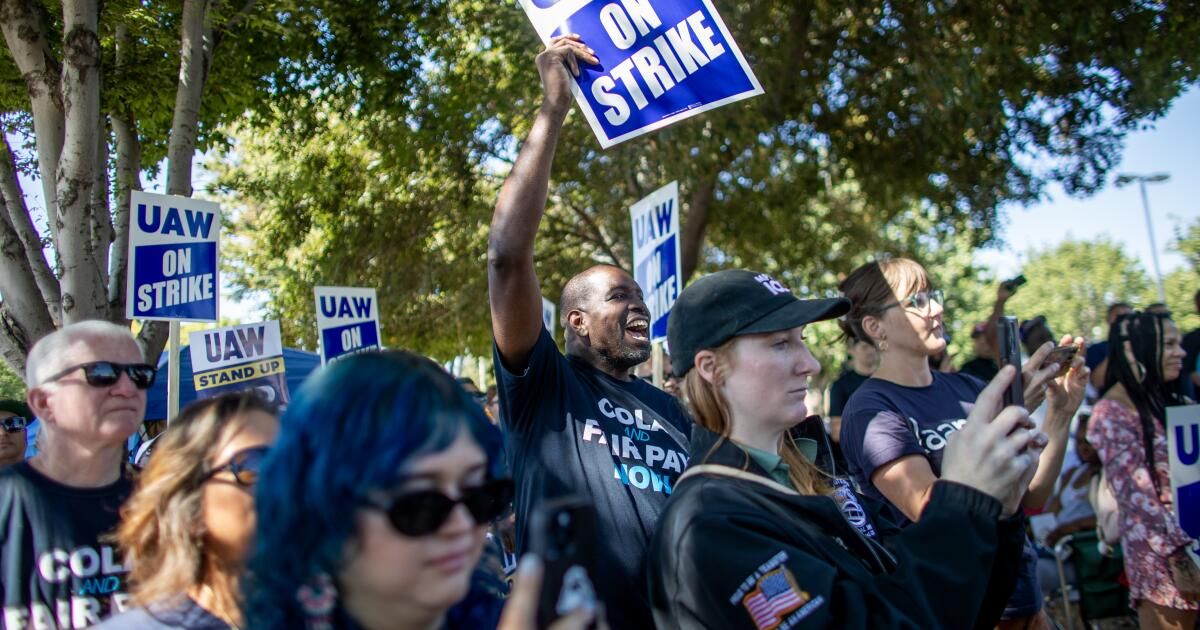UAW workers protesting outside an auto parts distribution center in Ontario say the jobs that once led them to flirt with middle-class status no longer provide enough for a decent living.
Workers were protesting outside the facility of Stellantis Mopar, which supplies thousands of parts for automobile repairs and upgrades. It's part of the United Auto Workers union's expansion last week of the strike against Detroit automakers that began Sept. 15.
Similar protests occurred at 37 other parts distribution centers across the United States, including a General Motors Co. facility in Rancho Cucamonga.
UAW Local 230 President Jesse Ramirez said wages for the 138 warehouse workers owned by Stellantis, the maker of Chrysler, Jeep, Ram and other brands, are not keeping up with inflation. What's more, a two-tier wage system means new employees can't earn more than $25 an hour, much less than what veteran employees earn.
“Our senior members receive $31 an hour, but anyone hired after 2015 at a parts distribution company cannot earn more than $25 an hour. They don't have a pension. They don't have medical care when they retire,” Ramírez said.
“This used to be a job that families worked on for generations. We have some members who are third, even fourth generation, working for the company. They were able to enjoy the fruits of their labor at the company, as well as good hard work. You can’t get that life anymore, especially at $25 an hour,” he said.
President Biden spoke briefly to striking workers at GM's Willow Run parts distribution facility in Michigan, urging the strikers to “keep going because they deserve the significant raise they need and other benefits.”
President Biden addresses striking members of the United Auto Workers union on a picket line Tuesday outside a General Motors plant in Belleville, Michigan.
(Jim Watson/AFP/Getty Images)
“UAW, you saved the auto industry in 2008 and before. He made many sacrifices. He gave up a lot of things when businesses were in trouble,” Biden said on CNN. “But now they are doing incredibly well and guess what? You deserve to do incredibly well too.”
By moving the strike to parts distribution centers, the union is trying to impact dealerships' ability to repair cars, analyst Sam Fiorani told the Detroit News.
“This shifts the strike to the consumer,” said Fiorani, vice president of global vehicle forecasting at AutoForecast Solutions. “There have been many parts that have been in short supply before this, and this is only going to exacerbate that problem.”
Union leaders said they did not target Ford Motor Co. parts warehouses because of progress made in contract negotiations.
Outside the Ontario warehouse where he works, Joel Benefield said he is at the lowest wage level and is “expected to do more work than others for less money.”
Benefield, 31, is a picker and packer, moving pieces from shelves into packages for later shipping. He said overtime has been scarce lately, which is a mixed blessing.
“I had a decent salary, but I worked seven days, 82 hours a week. He had no life outside of the office. “No one should have to work that hard for $1,000 a week,” Benefield said.
Others in play were top-tier veterans earning more than $31 an hour. They were picketing to say that higher wages for everyone should be a priority.
Raúl Escudero is in charge of returns at the facilities, checking if they can be fixed and sold or if they should be discarded. Escudero is at the top of the pay scale after 30 years at the facility, earning more than $31 an hour.
“The two-tier salary system is unfair for the young people who work here,” said the 52-year-old union leader. “When I started here I was able to pay my mortgage. He allowed my wife to stay home with the children. Now it is difficult to maintain that figure even at $31 an hour.”
Ramirez said the union made many concessions to keep the company afloat when it was in financial difficulty, but the company has not reciprocated and has instead eliminated significant revenue.
“This tiered pay system, the loss of our pensions, the loss of raises during bankruptcies, the cost of living increases… all of this was paid back by our members when the company was in trouble,” Ramirez said.
“Now it's your turn to step forward,” he said. “The only thing we ask for is what is due to us in justice. The only thing we ask is that they give us back what we lost.”
Gulf War Army veteran Michael Carter said that when he started working at the Ontario facility 29 years ago, “I came home after Desert Storm. I had no job and no address. This company hired me. I made almost $16 an hour and that was pretty good back then. Now I'm making $30. “A $15 increase in 29 years is just not good.”
For younger workers it's much worse, said Carter, 56. “And they keep taking things from us. They took away our pensions. They took away some of our five-minute breaks. They took away our bonus checks. They have never returned any of it. Now we don't even have cost of living increases. This has to change.”
Striking Ontario worker Mark Fernandez, 51, said the strike is hard on union members but worth the risk.
“I don't want to go on strike,” Fernández said. “I'm losing half my salary right now. I get some money from the strike relief fund. But I'm here because we've lost a lot. “If we don’t win, I’ll go out and look for a second job.”
The Detroit News via Tribune News Service contributed to this report.










